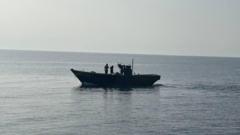South Korea has officially repatriated six North Koreans who ventured unintentionally into its waters, with authorities affirming their strong wish to return home. This repatriation, carried out by the South Korean Ministry of Unification, involves two individuals who had been in the South since March and four sailors who drifted across the maritime boundary in May. This marks the first return of North Koreans under President Lee Jae-myung, who has advocated for improved ties with North Korea.
In previous instances, both Koreas coordinated to return North Koreans wishing to go back through land routes. However, inter-Korean communication was severed in April 2023 as tensions escalated. Notably, North Korean leader Kim Jong Un stated recently that reunification with the South was now impossible.
Despite efforts by South Korea to inform the North about the repatriation via the United Nations Command, a response was not received, leading to speculation about behind-the-scenes negotiations between the two nations. Observers noted North Korean patrol boats at the handover point, indicating possible clandestine arrangements.
Experts have expressed concerns for the six individuals upon their return, suggesting extensive interrogation awaits them regarding any potential espionage activities or sensitive information they may have come across while in the South. Following this questioning, it is anticipated that they may be coerced into disseminating propaganda that would reinforce Kim's regime.
The political environment surrounding this repatriation is complex, with criticism arising from some North Korean defectors. Activists like Lee Min-bok lament that these individuals should have been given an opportunity to learn about life in the South before being sent back. Lee, who was involved in anti-regime activities, fears that lack of engagement may lead to increased risks for returnees as they face North Korea’s punitive measures for their time spent outside the regime.
President Lee has indicated a desire to foster engagement with Pyongyang, evidenced by the suspension of military propaganda broadcasts over the border. However, analysts remain skeptical of significant advancements in inter-Korean relations, especially given North Korea's evolving partnership with Russia and current South Korean public sentiment that appears wary of renewed dialogue. With limited signs supporting the reopening of communication pathways, the future of North-South relations remains uncertain.



















